Allowing coyote hunting on your farm is the cheapest and most efficient way to protect your flock from a determined predator like a coyote.
If you have already suffered livestock losses from coyotes, they will return to feed again. Over the next few weeks, they may kill or wound other animals. These repeat coyotes will test your defenses, damage your property, and keep you up all night trying to ward them off.
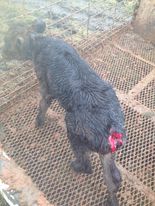
As the weeks go by, these coyotes will become more emboldened. They will exchange defenseless calves for full-grown cows. Some wounded cows will require euthanasia or expensive veterinary services at best. A coyote attack can also leave you feeding a wounded and non-producing animal for weeks—only to be forced to destroy it in the long run.
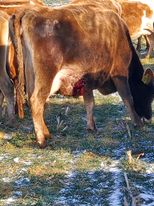
And a single coyote could become a pair, and that couple could become an entire family.
You are a farmer, and you have to work while the sun is shining. You cannot afford to be up all night with a shotgun, listening for four-legged outlaws and staring into the pitch black.
So what are you to do? How can you protect your farm, livestock, and flocks without spending a fortune on additional equipment?
The best decision you can make is to allow coyote hunting on your property.
Why? Because, your local coyote hunter has the weapons and equipment required to effectively protect a small area. Coyote hunters know how to get the job done. More importantly, they have the time to do it. With your permission, and a few nighttime visits, they can put an end to your loses.
Better still, coyote hunters can also be used to remove troublesome foxes and hogs.
As a form of intensive predator control on a farm, coyote hunting targets and eliminates only the specific predator responsible for that farm’s livestock losses. Coyote hunting also prevents attacks by transient coyotes and the establishment of new coyote families on or around a selected farm.
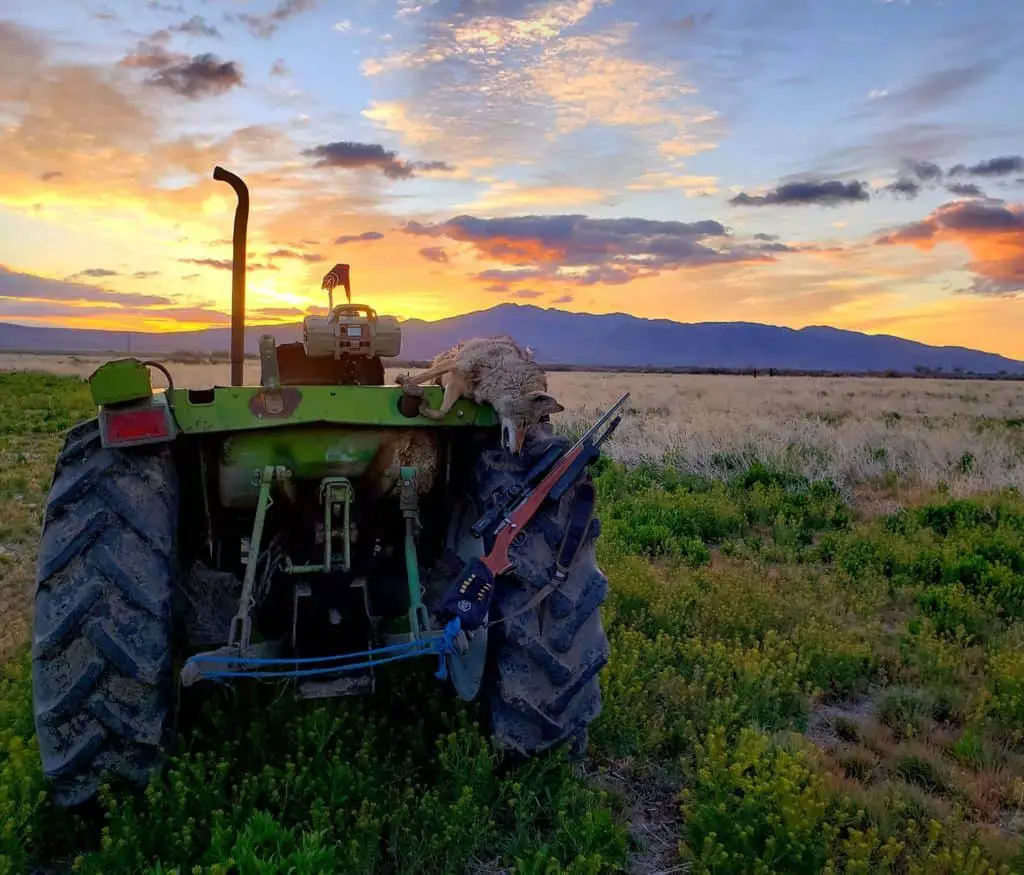
Why coyote hunting helps local farmers.
Every farmer understands coyotes are opportunistic, generalist predators. They prey on many different species, switching between animals with nothing more dictating their menu than what is plentiful.
The opportunistic aspect means a coyote can change its strategy depending on its target. An opportunistic coyote will attack prey too busy feeding to notice it with one technique and use another on a vigilant game animal.
What many farmers do not know, however, is that coyotes are surplus killers.
And surplus killers can have a devastating effect on your farm.
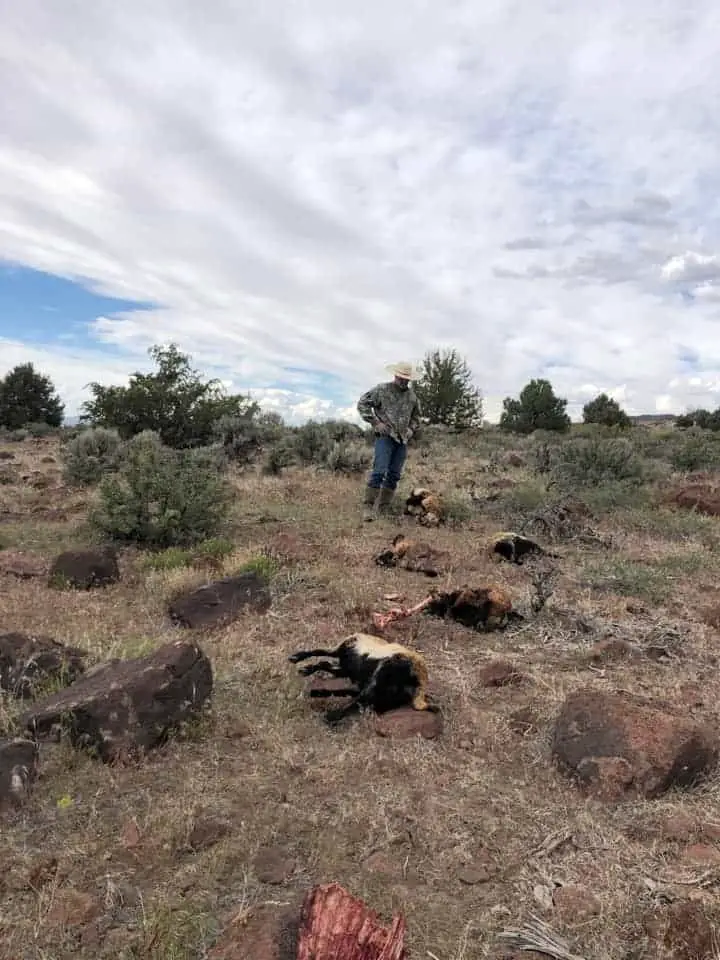
Surplus killers are the true enemy of farmers and flocks.
Surplus killing is killing excess prey that is not fed upon by the attacker, its young, or a member of the family unit. A farmer with three dead sheep, but only one half-eaten carcass, has been visited by a surplus killer.
While that farmer may be justifiably upset over the unreasonableness of the damage and financial loss, they should consider themselves lucky.
Lucky, at least, for now. Why? Once a surplus killer has found its way into your herd or flock, it will be back.
If the farmer has not yet removed the remains of a previous attack, they may soon discover a much worse problem with surplus killing coyotes. Future attacks may end with more fresh kills (torn to pieces but uneaten)—with only the previously killed carcasses fed upon during these attacks.
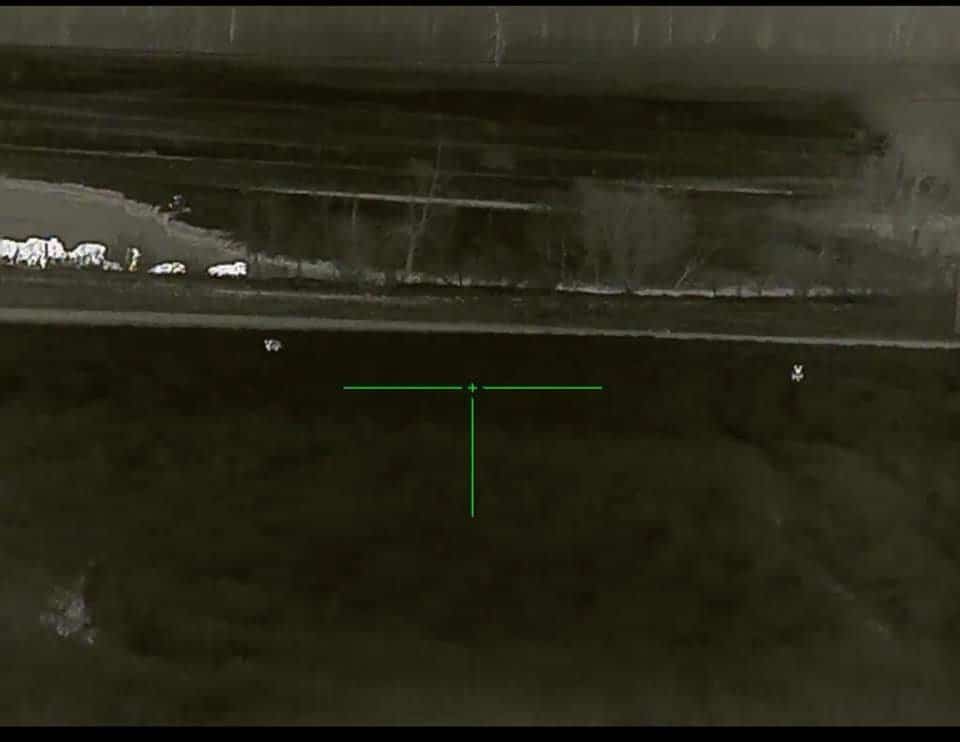
A note on the picture above: It shows two coyotes (inbound, with cows in the background) that were caught in the act of chasing a cow up and down the fenceline.
Mr. Cummings was protecting the farm that night, noticed the coyotes pursuing the cow, distracted them away from the cow with calls, waited until he had a safe shot, and took both coyotes down.
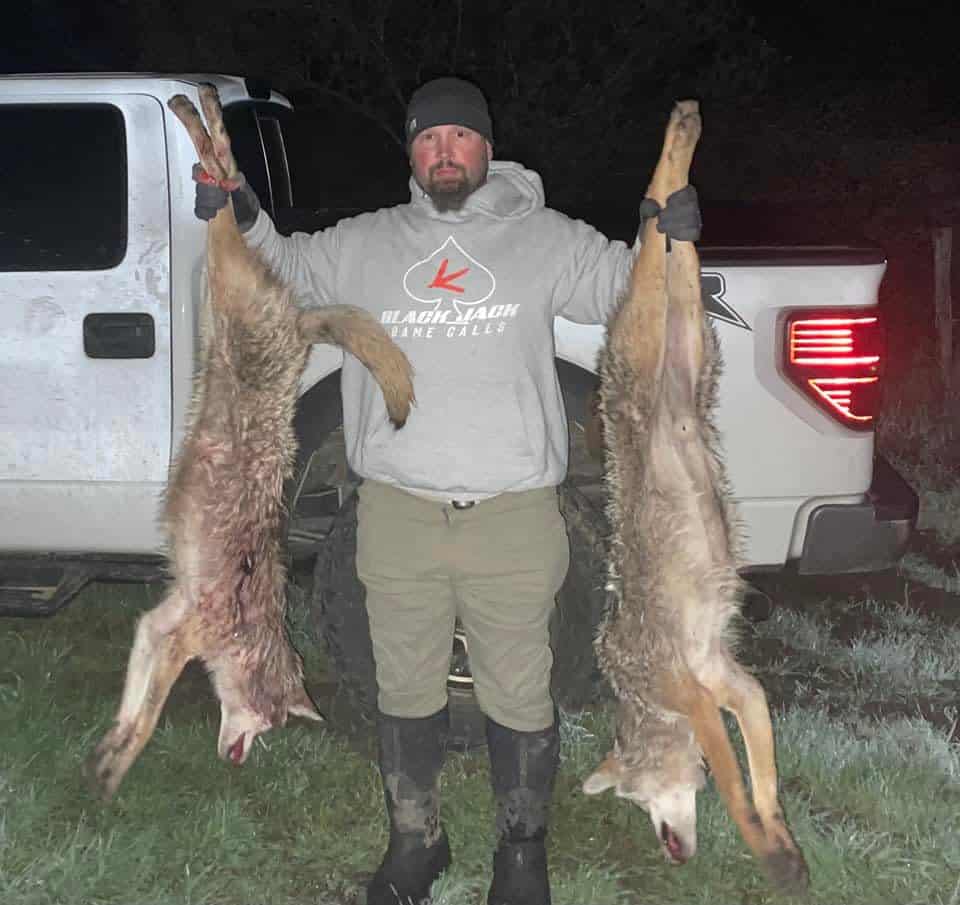
Farmers can save time, money, and livestock by allowing coyote hunting.
A small family farm spends roughly $50 and 16 weeks to raise a single broad-breasted turkey. For one year, the cost to care for a sheep is nearly $1,000. How many of these animals can a small farm afford to lose?
According to the USDA, “Many small farms are not profitable even in the best farm income years.” Most small farms rely on “off-farm” income to survive. That means someone has to work a day job because farming is a money-losing business.
And this was before 2022 arrived. With bird flu, Iowa farmers alone are expected to lose 1.9 million turkeys.
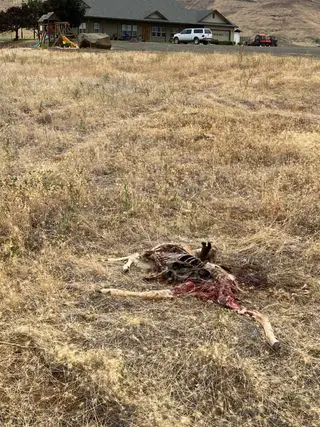
And the smaller the farm, the more the livestock income means to the family. Let’s face it, fences, livestock guardian dogs, and electronic devices are either too expensive or flat out do not work. I’ve experienced this personally. And I know small farmers who have had as many as 300 birds killed in a single spring.
Once a coyote has fed off a farmer’s livestock, there is only one sure way to eliminate the problem. It isn’t by spending thousands of dollars on a livestock guardian dog or a set of glowing red light bulbs. It’s by allowing coyote hunters permission to hunt your property.
Your local predator hunter can quickly call in and eliminate livestock-killing predators like coyotes, foxes, and bobcats. They are also happy to remove raccoons, wild boars, and other property-destroying animals. The majority of them will do it quickly and at little to no cost to you.
How to find a coyote hunter to help protect your farm.
If you are lucky, a local coyote hunter has asked you for permission to hunt your property. May I suggest you let them?
Let’s face it, the man or woman asking is willing to bring thousands of dollars worth of equipment, years worth of training, and some of the finest marksmanship skills in the world.
Seriously, I am a former Marine. Marines pride themselves on their shooting skills—but I know very few that can hit a running 4″ target at over 100 yards. Your local predator hunter can do that while lying motionless in temperatures so far below zero that a Navy SEAL would ring the bell and go home.
Finding a local coyote hunter.
But how do you find a local predator hunter willing to help protect your farm?
You can start by checking out a few of these FaceBook pages. The list is in no particular order, and only a few have the states they served listed—so feel free to join a few and post as many questions as you like. You won’t find a more friendly or helpful collection of folks anywhere else on the internet.
Coal Country Killers near West Virginia, Appalachian Coyote Hunters also West Virginia, Predator Hunting 101, with over 35,000 followers this group covers the entire United States, NH Coyote Hunting covering New Hampshire, Predator Hunting United Nation, Coyote Callin Outlawz, near Kansas, Coyote Hunting in Tennessee, Coyote Cowboys Predator Control, West Virginia, Coyote Spec Ops (a group serving several areas), Ohio Coyote Calling Series, Ohio, Predator Hunting Discussion Group (general info site), Predator Hunters, and 402 Predator Hunters in Nebraska.
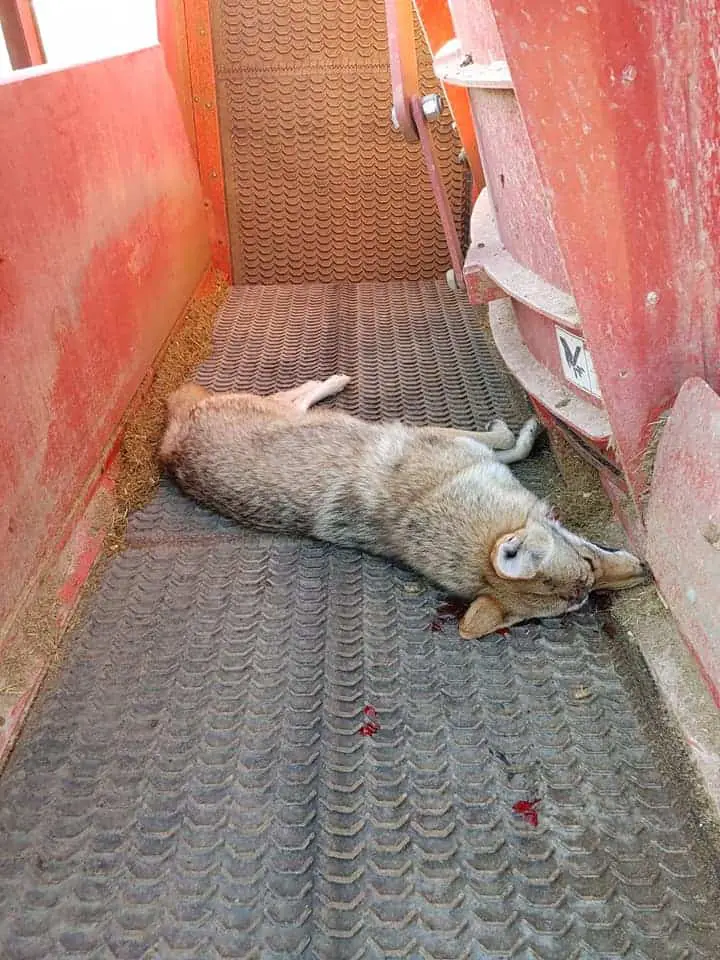
Does coyote hunting cause an increase in coyote populations?
Those who want to end coyote hunting make some fabulous, unscientific claims. One of the most common myths is that killing coyotes only leads to more coyotes being born.
This tactic is little more than a misunderstanding of carrying capacity or a deliberate lie. It fails to understand the coyote hunters’ “localized” effect on a given habitat as predation factors. At its worst, it assumes coyotes have some magical ability to be aware of the deaths of other non-family unit coyotes. Armed with this information, coyotes then somehow produce more pups in each litter.
And it isn’t just the anti-hunters. Some misinformed scientists think coyotes play an indispensable role. They think we should leave them alone and let them do their” jobs.”
Ironically, these scientists also applaud the restocking of fish and reintroducing wolves. Yet, maintain man’s efforts at predator control are ineffective. As a result, they feel free to deny that we can achieve our goals of managing the populations of game animals.
Experts and anti-hunters forget that the eastern coyote only materialized in the 1930s. They don’t acknowledge that it is a hybrid and one that continues to grow in numbers and size. Rest assured, as the number of livestock killed and attacks on humans increase, these people will never admit they were wrong.
Our ability to control the coyote population is denied by the same experts who claim wooly mammoths, giant beavers, passenger pigeons, and a host of other animals were hunted to extinction by man. But, somehow, coyotes have a magical power to survive man’s hunting efforts and even thrive as a direct result.
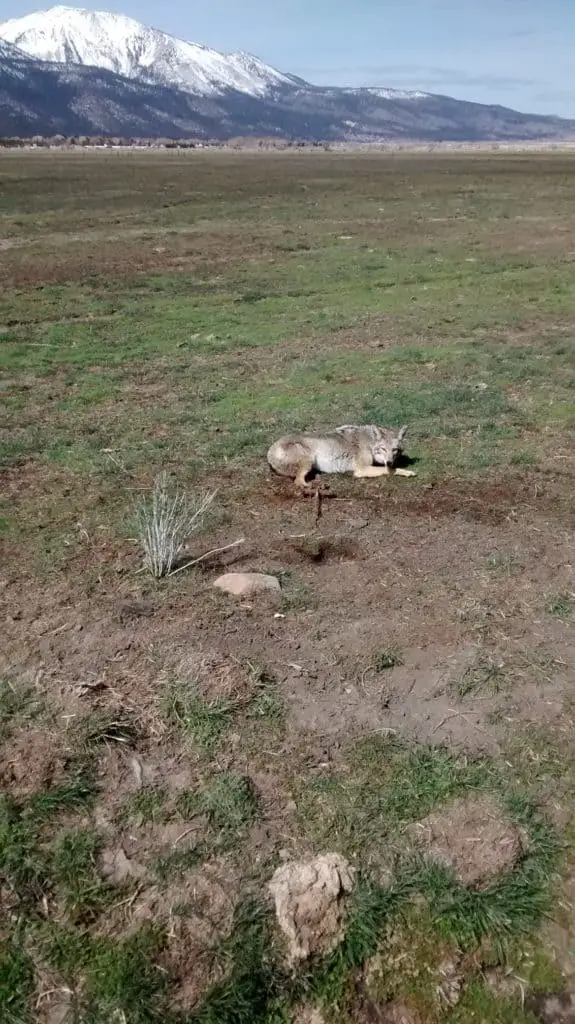
How coyote hunting effects an area’s resident and transient coyote population.
As a farmer with a coyote problem, you should first understand that two types of coyotes could be causing the problem.
Resident coyotes.
The first type of coyote is the resident coyote. A resident coyote will consider your farm to be part of its territory. It will constantly patrol, mark, and hunt prey on your shared land. It will defend ”its” land against other coyotes and even your pet dog.
A resident coyote will likely have a mate. These mated coyotes will establish a den, have a litter of pups, and provide for them from local resources. Eventually, this local family unit will hunt together, and your farm will become a tempting target for up ten fully-grown predators by next fall.
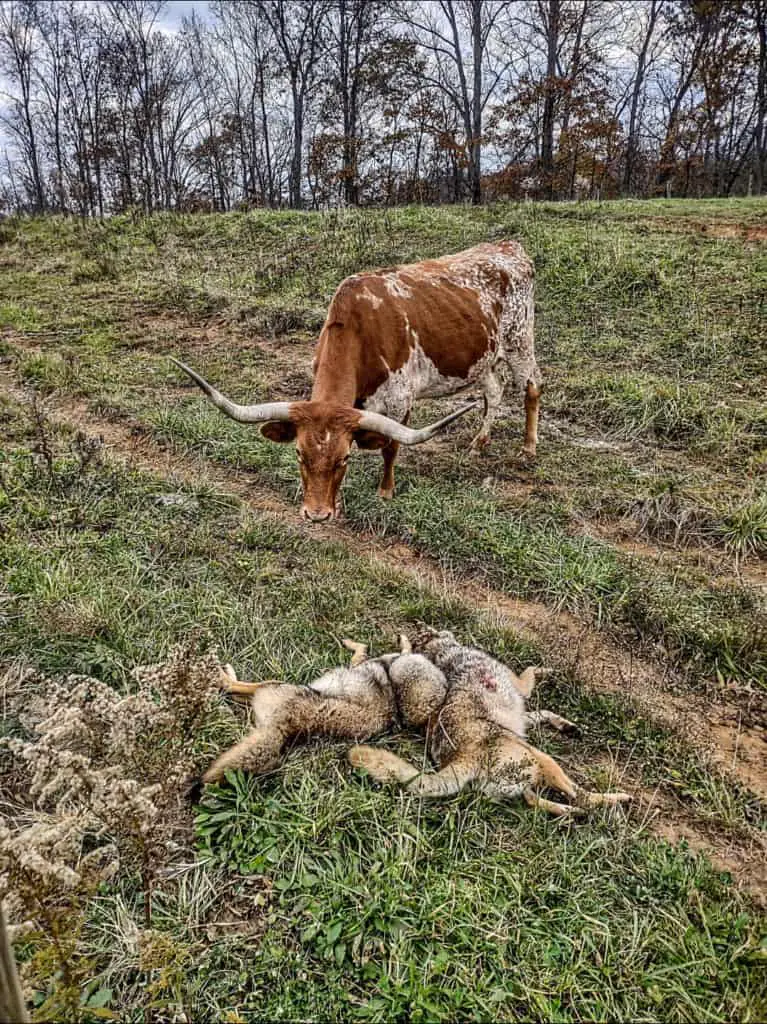
What happens if you kill a resident coyote?
Depending on the time of year, the death of a resident coyote will mean:
- If killed during mating season, there will be no mated pair; hence, no pups.
- If killed during pup raising season, the loss of an Alpha could cause the death of the entire litter.
- If killed during or after pup dispersal season, there’s just one less possible attacker on your farm.
There is no downside for a local farmer when a resident coyote is removed. If there are survivors, they do not suddenly begin to reproduce more pups (coyotes only have one litter per year).
Removing a resident coyote also does not create a power vacuum that sucks in other, new coyotes. Residency is established only during certain months after the pup dispersal season. The resident you killed has already forced other coyotes to move along and stay out of its territory.
Transient coyotes.
Transient coyotes are year-old pups who have been forced out of their parent’s territory. They have one job; to start their own family unit. A transient coyote begins its new life looking for both a mate and a suitable habitat.
A single, unpaired coyote will typically first exploit the cultivated land around your farm. Here the abundance of mice, voles, and grasshoppers are more than enough to prevent an attack on your livestock.
However, if that coyote finds a mate (or a newly mated pair set up a nearby den site), you have a resident coyote problem.
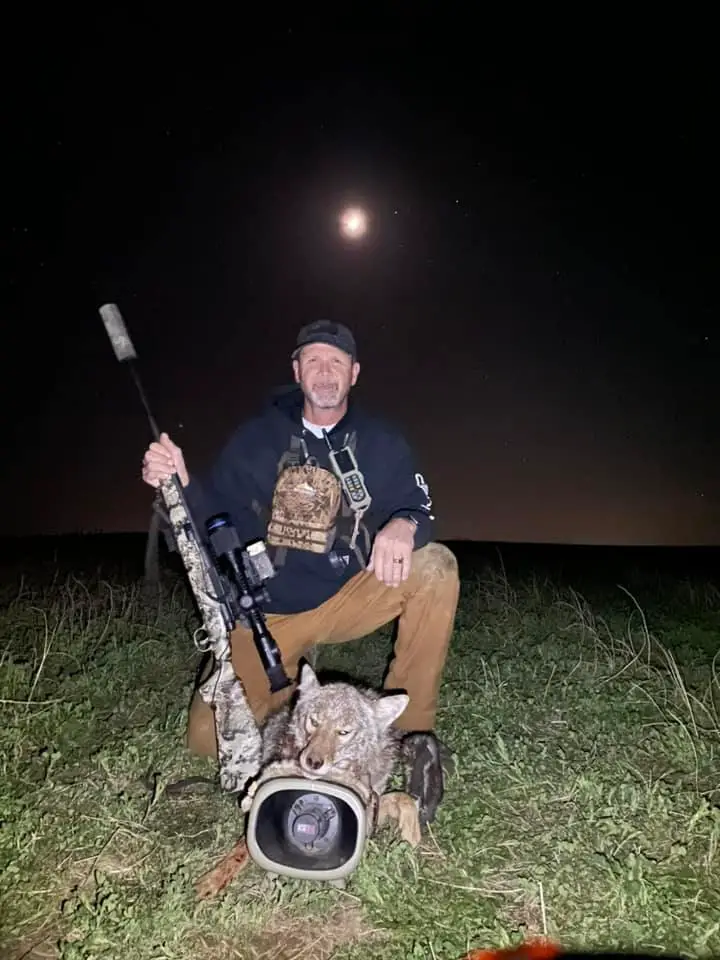
What happens when you kill transient coyotes?
First of all, transient coyotes are a temporary problem. However, to effectively handle this type of coyote, you either have to hunt them all season (October — March) or allow a local coyote hunter to do so for you.
Killing transient coyotes is a bit like a Whack-A-Mole. There could be many more in the area. To be successful, you will need to employ an intensive predator control program like coyote hunting, at least until the end of mating season.
Once again, removing a transient coyote does not increase the local population. It reduces it. Coyote hunting, employed early enough, should prevent attacks on livestock.
Why use coyote hunters to protect your farm?
While farmers can do their own coyote hunting, most do not have the time, energy, or equipment to do it frequently or successfully enough to address the problem.
Allowing coyote hunters access to your land (especially during the regular coyote hunting season) is more effective because:
- Coyote hunters have advanced equipment and tactics designed specifically for the job.
- Coyote hunters know how to detect, call, and target coyotes at longer ranges and then call them into locations that allow their safe removal.
- Most coyote hunters are willing to trade access to your land for services rendered.
Your local coyote hunter will walk the land with you, show you where they want to call and shoot from, and set up agreed-to dates and times that they will access your land. They will treat your property with respect, secure gates behind them, and slip in and out without distressing your animals
They will be willing to explain the sounds they will use, how long they will typically be on your land each night, and glad to have you join them on a stand.
If there is a down side to letting a coyote hunter kill a few problem coyotes, some of them may ask for deer hunting permission. However, a firm “no” is rarely a deal beal breaker.
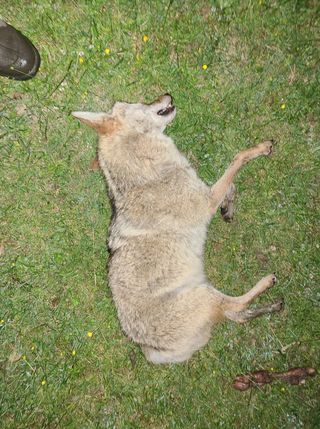
Intensive, localized coyote hunting of small farms is effective.
Researchers have studied the effect of intensive (trapping and hunting) of predators on deer populations. In my article on the effect of coyote hunting on deer survival, I point out:
“Way back in 1977, one of the first-ever studies to compare a “treated area” (an area where coyotes had deliberately been removed by trapping or shooting) to an “untreated area” was published. The researchers found that a “significantly higher number of fawns entering the winter period survived” in the treated areas than in the untreated area.”
“Since then, … other studies have reported similar findings. For example, one in southern Georgia in 2009 found that there were twice as many fawns per adult doe after coyote removal in the removal zone as in a similar non-removal site.”
The success reported by those studies was accomplished solely using paid workers. Thus, the added benefit of recreational coyote hunting was not factored in.
Surely, the removal of coyotes through predator hunting will have the same effect on your livestock survival rates.
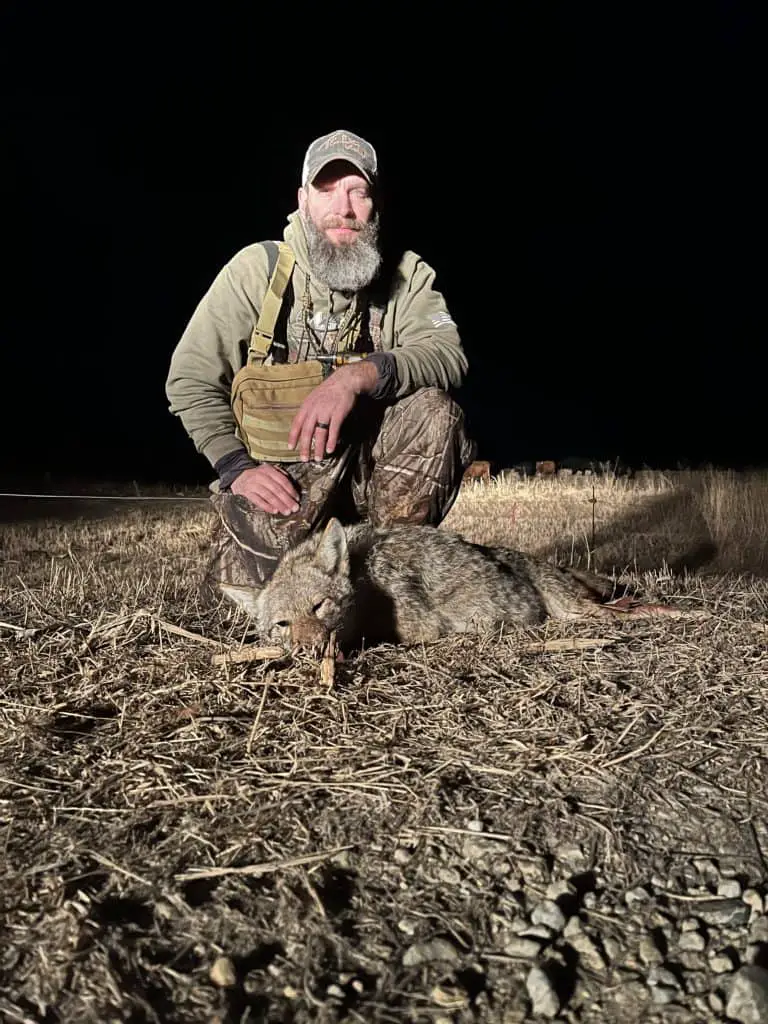
Brian Rush is the owner of Rush Custom Callers. His Rabbit Squealer can be used by anyone and coyotes, foxes, and bobcats cannot resist it.
Coyote hunting is a sport and a benefit to everyone.
The sport of coyote hunting produces jobs, provides recreation, and brings in tax dollars. Hunting licenses and fees help support parks and other wildlife preservation efforts.
The many farmers, ranchers, and landowners who already allow coyote hunters access to their lands suffer far fewer pet and livestock losses to predation.
Yes, removing the coyotes troubling your farm is possible. However, destroying the entire coyote population is no one’s ultimate goal. The purpose of intensive, local predator control is to protect a small, specific area for one year.
Next year, you will start all over again.

